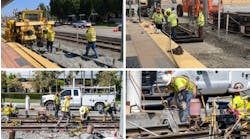SEPTA Positive Train Control Update
As SEPTA reported in its last update, toward the end of 2015, Congress and the President authorized a 3 year extension on the deadline for freight lines and inner city and commuter rail systems to install Positive Train Control (PTC) systems.
While this will give some transit systems a longer window to complete infrastructure improvements, for SEPTA, the extension effectively resets the clock on the deadline for the final phases of the project. It also changes the FRA's time frame to review SEPTA's submissions and provide comments prior to issuing their final approval. SEPTA is working cooperatively with the FRA on two important requirements:
- Safety Plan: submitted for review; received back partial comments
- Implentation Plan: plan revised and resubmitted at the end of December, 2015 in accordance with the new legislation requirements
SEPTA says that work is 100% complete on its signal system, the communication system, and car fit-out on the Silverliner IV and Silverliner V fleets, the company's internal efforts are focused on:
- Electric Locomotives/Cab Cars Fit-Out - Scheduled to be completed early February
- Control Center Software Installation - Completing final stages of testing
- Employee Training - Substantially complete
Pending completion of these efforts and final approval from the FRA, SEPTA is hopeful that the rollout of its PTC system can begin in February. As currently proposed, SEPTA implementation, for its Regional Rail Lines will occur in 3 phases with each phase taking several weeks to complete:
- Phase 1: Deploy PTC on our Single Track service (inbound and outbound service using the same track) beginning with the Warminster Line
- Phase 2: Deploy PTC on our Two Track service Lines
- Phase 3: Deploy PTC where we operate Multi-Track Service (more than 2 tracks)
Amtrak is currently operating their PTC system, called the Advanced Civil Speed Enforcement System (ACSES), on the Northeast Corridor and they expect to add the Harrisburg Line in February. In preparation, SEPTA says that it is currently testing its cars (non-revenue service) to see how its system interfaces with Amtrak. Deployment of SEPTA's PTC equipped vehicles within Amtrak service territory will be interspersed in the phases noted above.
Developing the SEPTA PTC system has been a complex, multi-year project but the benefits the company gains make this a strategic investment in the safety of its system. SEPTA says that it is working hard to minimize the impact to customers when the company transitions to PTC but SEPTA is the first transit agency to put ACSES on a commuter rail system so it won't have the benefit of lessons learned from an industry peer.
The rollout schedule is designed to give SEPTA time to react and make adjustments as needed, but SEPTA says that with any new technology there will be issues and the company is asking for continued patience and support as it builds a safer system for our customers.


